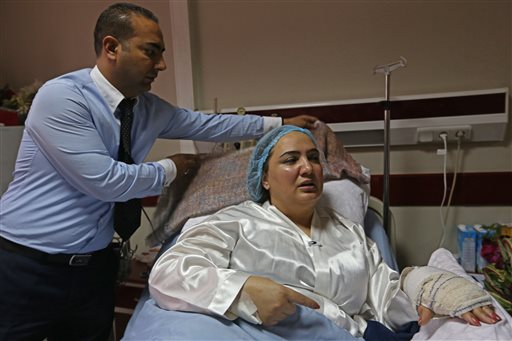KABUL, Afghanistan (AP) — Afghan lawmaker Shukria Barakzai says the suicide bomber who plowed into her motorcade a week ago wanted to silence a voice on women’s rights with a deafening blast.
Barakzai is lucky to be alive after her attacker rammed a car full of explosives into her armored vehicle, killing three civilians and putting her in the hospital with minor injuries. Human rights groups fear that the cause to which she is committed — bringing women into public life in the deeply conservative country — is also in peril.
With U.S. and NATO combat troops set to withdraw by the end of the year and many international organizations also scaling back operations, they fear that the Afghan government will be under less pressure to uphold women’s rights, providing a new opening for conservatives to roll back gains made since the 2001 U.S.-led invasion that toppled the Taliban.
“I was the target of this attack simply because I am a defender of women’s rights, a defender of human rights, and I value democracy and freedom of speech,” Barakzai said from her hospital bed.
No one claimed responsibility for the attack, which bore the hallmarks of the Haqqani network, a Taliban affiliate based in Pakistan that sends suicide bombers against prominent targets.
Attacks in the capital Kabul have escalated since President Ashraf Ghani took office in September. Insurgent groups oppose the bilateral security agreement he signed with Washington, ratified by Parliament on Sunday, as well as his support for women’s rights and peace talks with the Taliban.
As Ghani prepares to meet international donors in London next month, he is under pressure from rights advocates as well as allies like Barakzai to stick to his commitments and ensure women have a central role in any peace talks.
But he is under equal or greater pressure from insurgents and conservatives in the Afghan government to abandon those commitments as the price for peace.
Jorrit Kamminga, a policy adviser for the charity Oxfam, says peace is not possible unless women are involved in the process.
“The exclusion of women will lead to an imperfect and unsustainable peace,” he said in an interview to coincide with the release Monday of a report titled “Behind Closed Doors.”
“We don’t need to promote women’s rights, it is already in the constitution,” he said. “What we need to do is urge the government to respect the constitution and carry it through to peace talks, connect those two elements, and make sure that women’s rights are connected to those peace efforts.”
Under the strict Islamic rule of the Taliban in the 1990s, women were confined to their homes unless accompanied by a male relative, required to hide themselves beneath burqas whenever they went outside, and banned from school.
Since being overthrown in 2001, the Taliban have been based in Pakistan, from where they and other groups plan attacks on Afghanistan aimed at driving out foreign troops and re-establishing their self-styled Islamic state.
In recent years, attacks against women have intensified, and have often been carried out with impunity. Women working as police, soldiers, lawyers, teachers, doctors, politicians, and rights activists have been attacked or killed as a warning to others to stay in their homes and remain dependent on their fathers, husbands and sons.
Conservative elements inside the government have pursued similar aims through legal channels.
Ghani’s predecessor Hamid Karzai appeared willing in 2013 to allow conservative forces in parliament to dilute legislation, including the law on the Elimination of Violence Against Women (EVAW). Women hold almost one third of parliament seats under an official quota, which was also assailed by MPs, who wished to cut it to a quarter. These efforts were defeated but concerns endure.
With U.S. and NATO troops ending their combat mission next month, international oversight is also falling as non-government organizations reduce their presence, leaving women even more vulnerable to a rollback of gains made in the last 13 years, said Patricia Grossman, senior researcher on Afghanistan for New York-based Human Rights Watch.
“There is going to be so much pressure on Ghani on women’s rights, not to stick to his commitments. We’re very worried that with the shrinking international presence it will be far easier for (conservative and insurgent) groups to make that kind of pressure stick, because women’s rights might be seen as expendable given other security demands on the government,” she said.

COMMENTS
Please let us know if you're having issues with commenting.